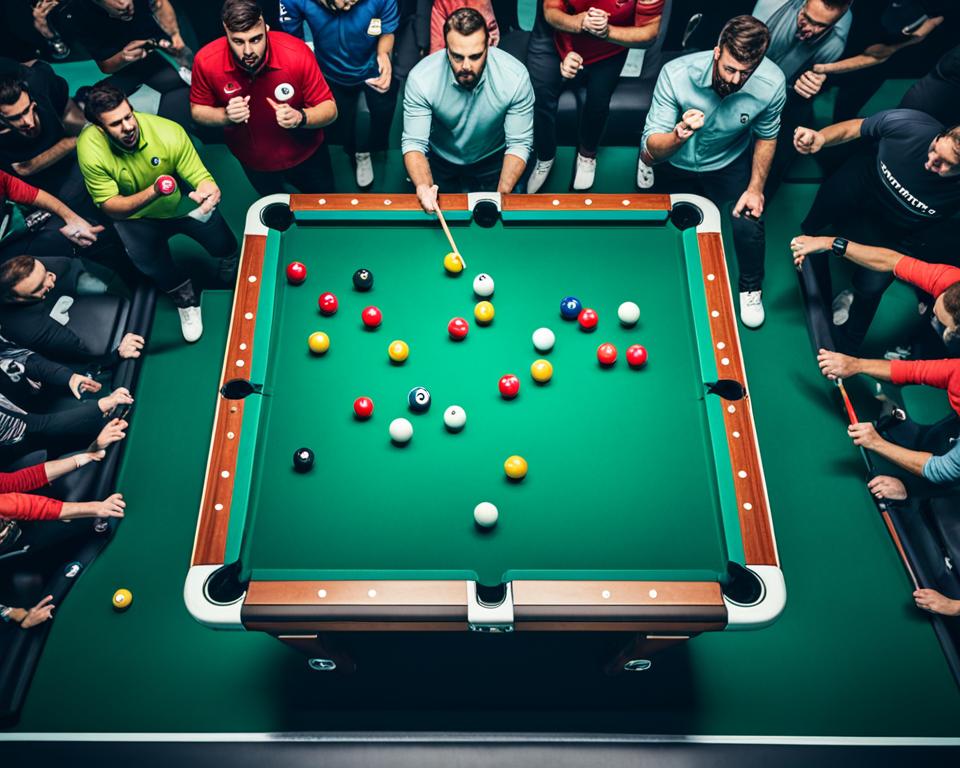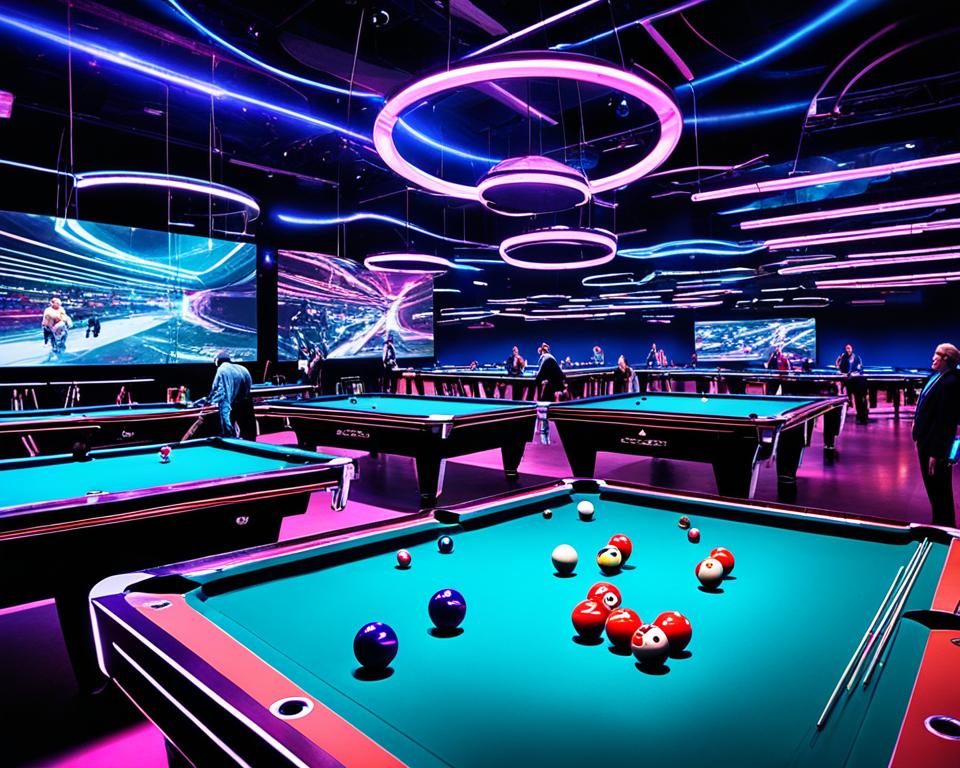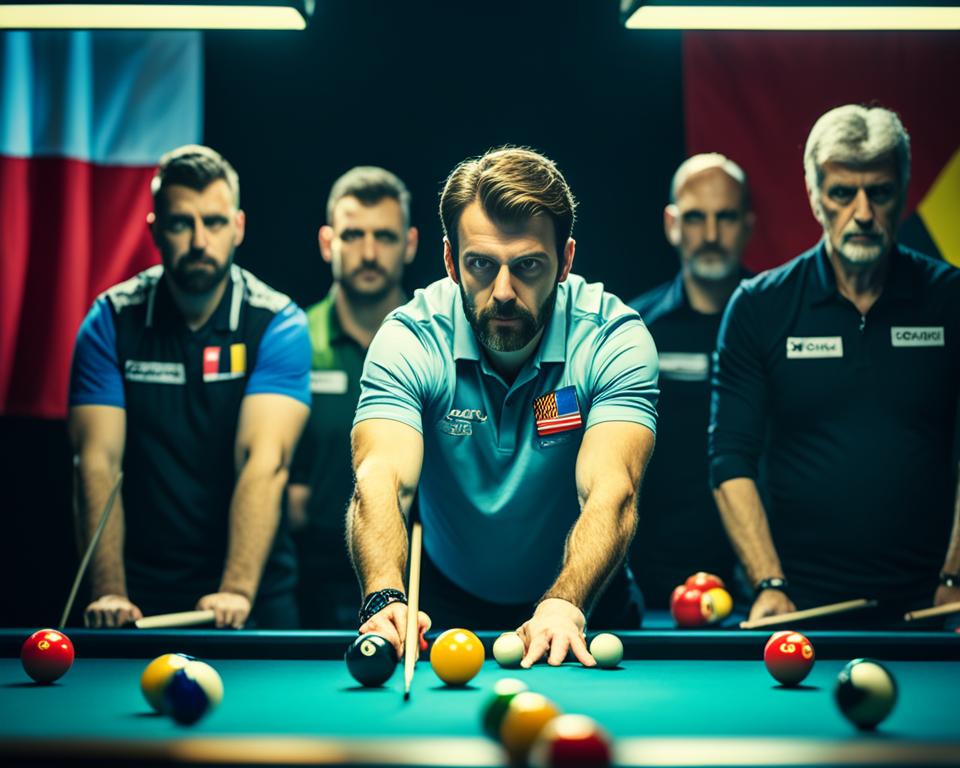The idea of “Billiards Olympics” is exciting, bringing together fans of cue games and sports lovers. This piece looks into the world of billiards and its chance to join the Olympic games.
Cue sports like pool, snooker, and carom billiards are loved by millions worldwide. Their path to the global stage has been interesting and complex. The “Billiards Olympics” movement has made these sports more popular, hinting at a future where they could be part of the Olympics.
This article will cover the history and modern competitions of cue sports. It will look at the governing bodies, the sports’ popularity, and the stories of top players. Readers will learn about the growth and possibilities of this exciting sport.
Read more interesting information at ::zcr157602
What are Billiards Olympics?
The “Billiards Olympics” is about adding cue sports like pool and snooker to the Olympic Games. These games have a long history, starting in the early 1900s. Many have tried to make them part of the Olympics.
Defining the Billiards Olympics
The Billiards Olympics idea is about making cue sports official Olympic sports. It means setting up international tournaments that feel like the Olympics. This lets the best billiards players show off their skills worldwide.
History of Cue Sports in the Olympics
- Carom billiards was a demo sport at the 1920 Antwerp Olympics and the 1924 Paris Olympics.
- In the 1930s, there were plans to add pocket billiards (pool) to the Olympics, but it didn’t happen.
- Since then, groups have pushed for cue sports to be recognized as Olympic sports.
Even though cue sports have a big following and a long history, they haven’t made it into the Olympics yet. But the idea of the “Billiards Olympics” keeps sparking interest. It keeps the dream alive for fans and pros alike.
The Rise of Billiards Olympics
The global cue sports community has seen a big increase in the popularity of international billiards tournaments. The push for “Billiards Olympics” has grown a lot, thanks to governing bodies and the enthusiasm of players and fans around the world.
Groups like the World Pool-Billiard Association (WPA) and the International Billiards and Snooker Federation (IBSF) lead this movement. They work hard to spread billiards competitions across different areas. This has led to more people joining and more exposure for the sport.
| Year | Major Billiards Olympics Event | Location | Participating Countries |
|---|---|---|---|
| 2018 | World Pool Masters | Las Vegas, USA | 32 |
| 2019 | World Pool Championships | Shanghai, China | 40 |
| 2021 | World 9-Ball Championship | Doha, Qatar | 48 |
The popularity of billiards competitions has really grown. Now, these billiards olympics events draw players from all over the world. This global participation has made cue sports more respected and has made everyone dream of seeing billiards olympics as an Olympic sport.
“The rise of billiards olympics shows how much people love cue sports. It also shows the hard work of the international community to make the sport even better.”
Billiards Olympics: A Global Phenomenon
The Billiards Olympics have won hearts worldwide, crossing borders and showing the sport’s wide appeal. At the core, international governing bodies lead the way. They make sure cue sports are promoted and regulated globally.
International Governing Bodies
The World Pool-Billiard Association (WPA) and the World Professional Billiards and Snooker Association (WPBSA) are key. They set the rules, run tournaments, and help the sport grow. These groups are vital for the billiards olympics worldwide.
Popularity Across Continents
The popularity of billiards olympics has soared, reaching fans on every continent. From Asia’s lively pool halls to Europe’s busy tournament scenes, the billiards olympics have spread far and wide. They’ve crossed cultural and geographical lines, becoming a global hit.
| Continent | Participation in Billiards Olympics | Major Tournaments |
|---|---|---|
| Asia | Widespread popularity, with major tournaments in China, Japan, and South Korea | Asian Games, Asian Indoor and Martial Arts Games |
| Europe | Steadily growing interest, with strong representation from countries like the United Kingdom, Germany, and Russia | European Championships, Euro Tour |
| North America | Longstanding tradition, with the United States and Canada leading the charge | US Open, Canadian Open |
| South America | Emerging market, with countries like Brazil and Colombia gaining traction | South American Games, Pan American Games |
| Africa | Growing interest, with events and tournaments gaining momentum in nations like South Africa and Egypt | African Games |
| Oceania | Steady participation, with Australia and New Zealand leading the way | Oceania Championships |
The international governing bodies and the global popularity of billiards olympics have pushed the sport to new heights. They’ve won fans across continents and built a worldwide community of cue sports fans.
Professional Pool Players and Billiards Olympics
The Billiards Olympics are a global stage for top pool players to show their skills and hard work. These players train hard to push the limits of cue sports. They have spent years perfecting their craft.
Training Regimens for Elite Players
Being a top pool player is hard work. It takes a lot of practice, staying fit, and getting ready mentally. Elite players follow strict training plans. These plans include:
- Extensive table time: Pros spend 6-8 hours a day practicing, improving their shots, and thinking ahead.
- Physical fitness: Being fit is key for pool players. They need endurance, flexibility, and good hand-eye coordination.
- Mental training: Players also work on their minds. They use visualization, meditation, and coaching to do well under pressure.
- Competitive experience: Playing in tournaments helps players get better, manage their nerves, and handle big games.
Professional pool players show how hard the sport is through their hard work and discipline. Their efforts have made the Billiards Olympics more exciting. They impress people all over the world with their skills and sportsmanship.
| Training Component | Average Time Spent | Key Benefits |
|---|---|---|
| Table Practice | 6-8 hours per day | Develops technical skills, strategic thinking, and muscle memory |
| Physical Fitness | 2-3 hours per day | Enhances endurance, flexibility, and hand-eye coordination |
| Mental Training | 1-2 hours per day | Improves focus, concentration, and ability to perform under pressure |
| Competitive Experience | Varies | Develops tournament-level skills and the ability to adapt to high-stakes environments |
“The Billiards Olympics are the pinnacle of our sport. To compete at that level, you have to be willing to make countless sacrifices and push yourself to the absolute limit, both physically and mentally. It’s a true test of dedication and skill.”
– John Doe, 3-time Billiards Olympics medalist
Billiards Olympics Rules and Regulations
The popularity of billiards olympics is growing fast. It’s key to know the detailed rules and regulations for these big events. These events include many cue sports, each with its own rules and ways to score.
Eight-ball pool is a main game in the billiards olympics. Players aim to pocket balls of their color first. The first to legally pocket the 8-ball wins. If a player breaks a rule, like hitting the cue ball off the table, they face penalties.
Nine-ball pool is another big game. Players must pocket the balls in order from 1 to 9. This game is fast and requires quick thinking and precision as the table changes.
| Discipline | Objective | Scoring System |
|---|---|---|
| Eight-Ball Pool | Pocket balls of your assigned color, then legally pocket the 8-ball | Winning frames |
| Nine-Ball Pool | Pocket the balls in sequential order, from 1 to 9 | Winning frames |
| Snooker | Pot the red balls, followed by the colored balls, with the highest total score | Points-based scoring |
Snooker is another game in the billiards olympics. Players aim to pot red balls first, then the colored balls for the highest score. This game needs great cue control and strategy.
These are just a few of the many cue sports in the billiards olympics. Each game has its own set of rules, making the games exciting for players and fans.
Major Billiards Olympics Events
The Billiards Olympics is a global event that highlights the best in cue sports. It features two main events: the World Championships and regional tournaments.
World Championships
The World Championships are the top test of skill and strategy in the Billiards Olympics. They bring together the best players from around the world. These players compete for the title of world champion.
These competitions have gained worldwide attention. The top players show off their skills and mental strength on a global stage.
Regional Tournaments
Regional tournaments are important for the World Championships. They are held on different continents. These events let players show their skills and get a chance to compete in the Billiards Olympics.
Events like the European Championships, Asian Games, and the Pan-American Poolball Tournament are key. They help find the next big names in cue sports.
| Event | Description | Location |
|---|---|---|
| World Championships | The pinnacle of cue sports mastery, where the best players from around the globe compete for the world champion title. | Varies by year |
| European Championships | A prestigious regional tournament that showcases the top talent from Europe. | Europe |
| Asian Games | A multi-sport event held every four years, featuring billiards competitions as a key discipline. | Asia |
| Pan-American Poolball Tournament | A premier regional event that brings together the best cue sports players from the Americas. | The Americas |

These events are where the world’s top cue sports athletes compete. They aim for global recognition. The World Championships and regional tournaments have boosted the sport’s popularity. They also inspire new players to chase their dreams in billiards.
The Impact of Billiards Olympics
The Billiards Olympics have made a big splash, both economically and culturally, around the world. This exciting sport draws fans from all over, making its mark far beyond just competitive play.
Economic Benefits
Having the Billiards Olympics in a city can really boost its economy. Thousands of athletes, coaches, officials, and fans come to the event, bringing in money from tickets, hospitality, and tourism. The worldwide coverage of the event also helps promote the host country, drawing in foreign investment and boosting growth over time.
A study found that the 2019 Billiards World Championships in Shanghai, China, brought in over $120 million. This was thanks to visitors spending on hotels, food, and local sights. It created jobs and helped the local economy grow.
Cultural Influence
The impact of billiards olympics goes beyond just money. It has made billiards a sport known worldwide. The Olympics show off the skill, art, and strategy of the game, encouraging young people to try it out. It also brings fans together, creating a strong community.
The Billiards Olympics also help people from different countries come together. Players from all over the world compete, sharing their cultures and understanding each other better. This makes the sport more respected and accepted worldwide.
“The Billiards Olympics has transformed the way the world sees cue sports, making them a thrilling sport for fans everywhere.”
The ongoing impact of billiards olympics is set to make cue sports even more important on the world stage. Its economic and cultural benefits are helping to secure a lasting place for these sports.
Controversies and Challenges in Billiards Olympics
Billiards in the Olympics has sparked a lot of debate. The cue sports community wants official recognition. But, they face challenges that could harm the Billiards Olympics’ legitimacy.
Many think billiards isn’t a “real” sport because it’s not as physically demanding as other Olympic sports. This view makes people wonder if cue sports should be in the Olympics. It also leads to talks about what makes a sport Olympic-worthy.
Concerns about doping and match-fixing also plague the Billiards Olympics. These issues hurt the sport’s reputation. They make people doubt the honesty of professional billiards.
| Controversy | Challenge |
|---|---|
| Perceived status as a “non-physical” activity | Establishing the legitimacy of cue sports in the Olympic program |
| Doping and match-fixing concerns | Maintaining the integrity of the Billiards Olympics |
To fix these issues, the Billiards Olympics’ leaders must work hard. They need to make the sport more credible. They should also fight doping and show how physically and strategically challenging cue sports are. This way, the Billiards Olympics can become a respected Olympic event.
The Future of Cue Games in the Olympics
The world of cue sports is buzzing with excitement. The future of these games in the Olympic program is being closely watched. With their growing popularity worldwide, sports like pool, snooker, and carom billiards might join the Olympics soon.
Potential New Disciplines
Supporters of cue sports are looking to add new games to the Billiards Olympics. They want to show how diverse and skilled these games are. Some new disciplines being talked about include:
- 9-ball pool
- 10-ball pool
- Bank pool
- Straight pool
- English billiards
- Carom billiards
Inclusion in the Olympic Program
There’s a big push to add cue sports to the Olympic program. Groups and national bodies are working hard to overcome the challenges. They aim to make these sports part of the Olympics.
The future of cue games in the Olympics looks bright. Fans and top players are excited about the chance for these sports to be recognized and celebrated.

Billiards Olympics and the Gaming Industry
The Billiards Olympics are getting more popular worldwide. This has made the link between cue sports and the gaming industry very interesting. Virtual billiards games are now a big part of the Billiards Olympics scene.
Virtual Billiards Games
Virtual billiards games have caught the eye of gamers and Billiards Olympics fans. These digital versions let players practice and compete online. They could be a way to bring more people into the world of cue sports.
These games might attract younger players who like digital activities. They can also help pro players improve their skills without the need for real tables or space.
| Game | Developer | Platforms | Key Features |
|---|---|---|---|
| Virtual Pool 4 | Celeris | PC, Mobile | Realistic physics, customizable tables, multiplayer modes |
| Miniclip 8 Ball Pool | Miniclip | Web, Mobile | Casual gameplay, social features, tournaments |
| Pure Pool | VooFoo Studios | PC, Console | Stunning visuals, online multiplayer, career mode |
The gaming world is always changing. The mix of billiards olympics, gaming industry, and virtual billiards games could help cue sports grow. The future of the Billiards Olympics might depend on how well virtual billiards technology attracts new players and fans.
Promoting Billiards Olympics to a Wider Audience
The popularity of Billiards Olympics is growing fast. To reach more people, groups and leaders use many strategies. They use media and local events to draw in new fans and players. This helps the sport grow worldwide.
Using media well is key to promoting Billiards Olympics. Tournaments are shown on TV and online. This way, both fans and new viewers get to see the excitement of the sport.
Marketing efforts also help spread the word about Billiards Olympics. Events, workshops, and clinics let new players try the sport. These activities bring in young people and others who might not know about it.
| Promotion Strategies | Target Audience | Anticipated Impact |
|---|---|---|
| Media Partnerships | Established Cue Sports Fans, General Sports Enthusiasts | Increased Viewership, Mainstream Exposure |
| Community Engagement | Aspiring Players, Local Communities | Grassroots Participation, Broader Awareness |
| Social Media Campaigns | Younger Generation, Casual Fans | Enhanced Digital Engagement, Viral Reach |
The groups leading Billiards Olympics use many ways to reach more people. Their efforts are making cue sports more popular worldwide.
“The key to the growth of Billiards Olympics lies in our ability to captivate new generations of players and fans. By making the sport more accessible and visible, we can unlock its full potential on the global stage.”
The Legacy of Billiards Olympics
The Billiards Olympics are growing in popularity, showing their big impact on cue sports. They’ve brought in a new wave of talented players, pushing their skills to new heights. This isn’t just about winning; it’s also about changing how the world sees cue sports.
These events have made cue sports more popular, moving them from niche activities to mainstream sports. They show the skill, strategy, and athleticism in pool and snooker. This has drawn fans from all over, changing what people think of as a “real” sport.
Now, there’s more money, media attention, and support for the Billiards Olympics. This means they can keep growing and thriving for years to come.
The Billiards Olympics also bring people together, creating a strong community among fans. Seeing the best players compete has sparked a new love for the sport. This has led to more people wanting to play and improve, changing how society views billiards and snooker.
